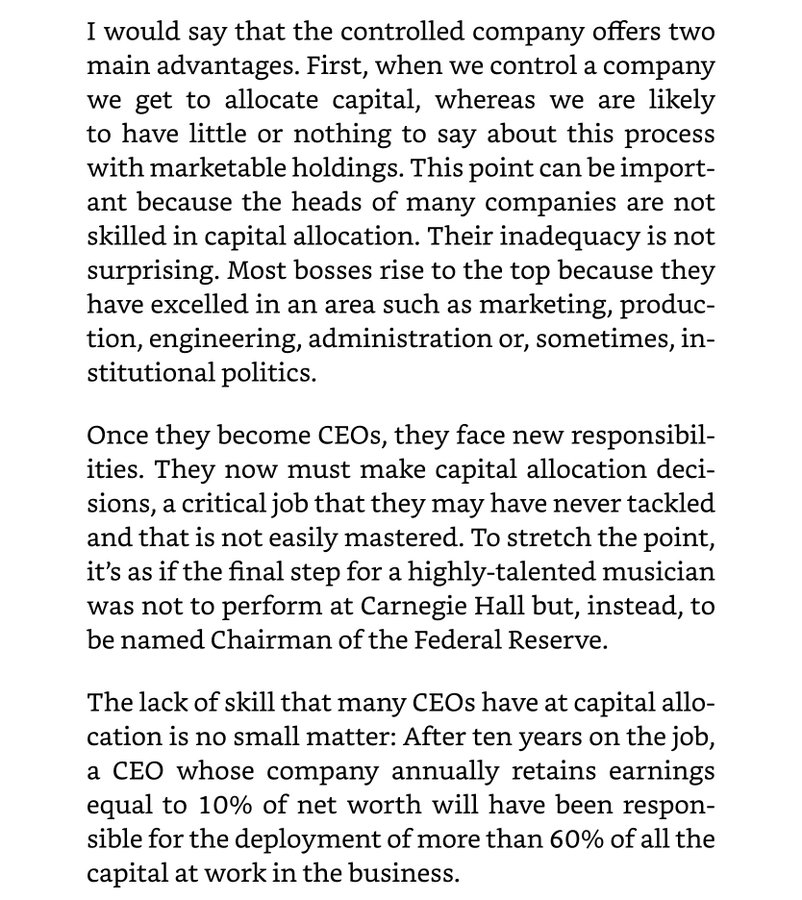The CEOs we work with are universally highly-talented, intelligent people, but they often lack a crucial skill set – knowing how to allocate capital.
We were reminded of this recently when we saw this Tweet with a quote from Warren Buffet.

His point, and we tend to agree, is that CEOs often rise to the top via a specialization in one particular function within a company – sales, marketing, operations, etc. And while those roles require careful weighing of options and resource trade-offs, they usually come within a contained set of actions and options. By contrast, allocating capital tends to be much more greenfield in nature – there are so many possible ways to invest.
This factor is common in technology as well. It is often more acute, as so many CEOs rise up through, or have worked solely in, engineering. Say what you will about engineering, but a hallmark of that field is the ability to go incredibly deep into any problem to be solved. Allocating capital requires the opposite, broader, sky-is-the-limit perspective.
We do not mean this in a disparaging way. Smart CEOs make smart decisions. It’s just that often CEOs approach capital decisions without the tools that experience and practice provide. Left to their own, they usually make the right decision, but as with all skills, sometimes it helps to have people who can complement the CEO’s skills. Even the 10x Engineer CEO or the quota-crushing Sales CEO hire engineers and sales people to extend their capabilities. Buffet sees allocating capital as his role via Berkshire. We at D2D see that as one of our prime offerings, albeit in a very different fashion.
The problem in start-ups is sometimes even more acute. Here, companies go from famine to feast very suddenly when they raise a round of financing. Companies and their management teams suddenly find themselves flush after months of scraping by. Just like the human body metabolizes differently after a period of hunger (or as we call it in Northern California, ‘intermittent fasting’), start-ups with a lot of money suddenly in the bank can see their decision making warped.
Should we launch that new product now? Freeze the product while we pay down technical debt? Launch that massive ad spend for our growth campaign? Provide health insurance for our employees? Full-time our contractors? And because most start-ups are always operating at full-tilt, there is often an unspoken rush to spend the money quickly. Sometimes that is the right answer, sometimes more deliberation is required.
And of course, the current state of the world exacerbates the problem. How big a rainy day fund should we squirrel away? What is the balance between growth and caution? We touched on these topics in our recent posts, and every company is going to have to make its own decisions.
In our consulting work, we spend far more time suggesting things to NOT invest in. Smart Chief Financial Officers (CFOs) should play a big role in these decisions, but most start-ups do not have any CFOs (and probably do not need one full-time until later in their lifecycle). The hard part is to not be the grumpy “Mr. No” CFO, but to understand the proposed allocation and be able to think through all the implications of any investment.
A big part of deciding how to allocate capital, especially fresh venture money, is to build out a good financial model. This does not need to be thirty tabs of VB-laden Excel. A simple model, outlining all expenses and a few revenue scenarios goes a long way. It is amazing how quickly $10 million or even $100 million can disappear. And usually, the more money the bigger the decision making problem.
Adding engineering heads always sounds like a good idea, but fully-loaded salaries add up really quickly. Similarly, it always good to have a sales team, but there are hundreds of books and incredible Twitter streams about how to balance top-down vs. bottoms-up, inside vs. outside sales. Hiring a full-fledged enterprise sales team is incredibly expensive, not only in dollars but in resources they will require (how many field/application/sales engineers did you include in that forecast).
Start-ups need to be move fast to survive, but big investments require careful thought and planning.

Pingback: CFO – Dr. No vs. The Enabler | DIGITS to DOLLARS·
Pingback: Raising Venture Funds under Uncertainty | DIGITS to DOLLARS·